Header image via New Old Stock
Games have always been something of a dark art to me, a mysterious form of modern magic, and for the longest time, I’ve played them, loved them, had profound experiences with them, but never really understood them.
How could endless lines of code make all that cool stuff happen?
All the pew-pews and the jumping and that?
It’s pure magic. How could it not be?
For years I wanted to peek behind the curtain to see what was really going on, to see what those wizards and witches were doing to make the aforementioned pew-pews and jumping. I didn’t want to be a muggle anymore. I wanted a taste of that delicious Hogwarts life.
And so a while back, I had a lick. I downloaded some games development software called Unity. It was free. And with it, I could make games.
So far so good, right?
Wrong.
The first time I loaded up the software it scared me so much I hissed and spat at the screen like a cat flanked by cucumbers. I then promptly uninstalled the application.
No way, I thought for years afterwards. No way is game development possible for a normal dumb-dumb writer like myself. No hecking way. And that was that… until 2020 rolled around and you-know-what hit the big time. Suddenly the world found itself with a little extra time on its hands and I wondered:
What if not no way?
What if yes way?
Tentatively, I reinstalled the Unity software, signed up for a cheap online course at Udemy.com, and I got to work, learning the ins and outs of games development. This time, though, I didn’t stop.
By the end of 2020, I’d made seven games. They weren’t good games, but nobody could say they weren’t, technically, games.
To say I learned a lot during that year would be an understatement. Most surprisingly, through the process of learning how to make games, I also picked up a few new lenses through which to look at my writing and my creativity in general.
I wanted to dish out some of that knowledge to the LitReactor Massive, share a few spells from the book of GameDev.
So here we go. Use them wisely. And always wear protection.
1 - Inspiration Will Meet You Halfway
The first game I made was a text adventure game. A simple project for beginners… supposedly. To a seasoned programmer, seeing me writing those first lines of code would be comparable to watching a dog eat its own shit.
“Why is he doing that?” the GameDev would say as he opened his camera app on his phone.
I consider myself a fairly technical person, but when I first opened up Unity I felt like I’d landed on an alien planet. Down was up. Up was down. In fact, I was feeling very down about being on an alien planet. I thought about giving up.
I didn’t sign up to make text adventure games. I signed up for all those amazing games I’d spent so many hours playing. The magic stuff, y’know? Why was I working so hard to make something that I didn’t even want to make in the first place?
Well, Daniel-san, sometimes it feels like you're waxing some old Japanese dude’s car but you’re actually learning how to be a badass karate-ninja-preneur. These things seem basic at first, but they’re the foundations you can build upon.
Once I’d nailed down the basic concepts of the code, I had an idea for a text adventure game I legitimately wanted to make. Suddenly, I was inspired. Then came that short period in my life where I was no longer Luke Kondor but the conduit through which this game flowed.
I woke up early to work on it. I stayed up late to keep working on it. A few days later I returned to my life like Tom Hanks at the end of Castaway, but instead of a package under my arm, I had my first game. It was called YOU’RE GOING TO DIE!
You can play it or watch somebody else play it, or just imagine it in your mind. Whatever floats your boat. The point is, sometimes inspiration for a story or a book is there from the get-go, guiding your hand as you type ‘Chapter Number One’, but more often than not it’s absent, and is in fact waiting for you a few thousand words in.
Wax on, Daniel-san. Wax the fuck on.
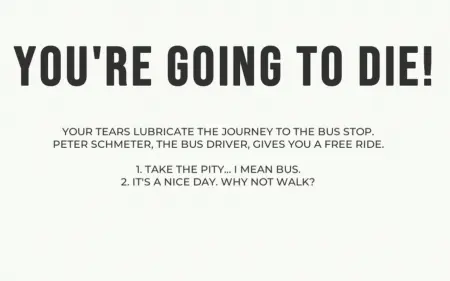
2 - Scopecreep (The Rule of KISS)
A common mistake for newbie GameDevs is to start out their journey by attempting to create the next World of Warcraft or some other Massive Multiplayer Online RPG experience. Usually those dreams get squashed when they realise how difficult it is to create the most basic of elements… say, add a custom font to a game.
It took me two hours on my first go. Seriously, two hours to add a font.
I’m smart. Shut up.
Wiser GameDevs tell us to take our game idea and cut the scope in half, and then half again, and to keep cutting until we arrive at something achievable. From there we have our small game project. It’s all going okay until that cheeky bitch scopecreep comes sneaking back in. It tells you that if you can add that one feature then there’s no harm in adding this other slightly related feature. And hey, if you’re going to take the time to add that one, you may as well add this other, slightly less related one. Before you know it, you’re once again looking at a mountain you’re never going to climb.
There’s a reason games are made by huge teams. These things seem easy enough in theory, but with every new element we add they become exponentially more complex.
And the same goes for writing.
Years back, I was working on my first novel and it was all going well until I thought, ‘Hey, why not make this bad-boy a trilogy?’
That didn’t happen. If anything, I made the novel worse by introducing a bunch of open story loops that I planned to resolve in later novels but never did because I had no idea how to.
I did the same thing a little later when I thought about writing a series of interconnected novellas. Again, that didn’t happen.
Make it achievable.
Just remember the rule of KISS – Keep It Simple, Shit-head.
3. Volume, Not Perfection
Early on in our learning phase, we can get lost striving for perfection in our projects. Take my third game, PAPER DEFENDER, as an example.
At this point, I was still learning the basics of game design. How to make things move when you press buttons. How to make things go pew-pew. Finally.
But what started out as a simple laser defender game, turned into a month-long obsession in which I developed multiple levels, hand-doodled an enormous number of assets, created an in-game currency with an upgrade system, and made a boss level using my own middle finger as the boss character.
I think maybe ten people played that game. If that. It took me a solid week of migraine-inducing effort to make the boss level and I don’t think anybody has even seen it.
In all honesty, I could have learned a lot more about GameDev if I’d cut the cord a week in and moved onto the next game. In any project, there comes a point of diminishing returns. You often find that the majority of the growth is achieved in the first ~60% of the development time. This is the part of the project when you’re working out the larger concepts, looking at it from a macro-perspective. That final 10% of development, the perfecting, the fine-tuning, the play-testing, it’s mostly just work.
To be clear, when looking at this through the context of writing, I’m talking about the beginning writer who has spent an inordinate amount of time fine-tuning their first short story, when they would be better served finishing it, sending it somewhere to get read, and moving onto the next story. If you’re still early in the learning phase of your craft, be it writing, filmmaking, cartooning, or say, sheep-shearing, don’t spend too long trimming the sheep’s nose-hair. It’s not worth your time.
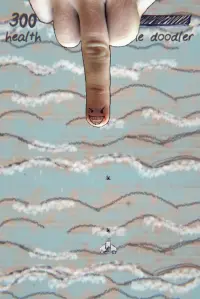
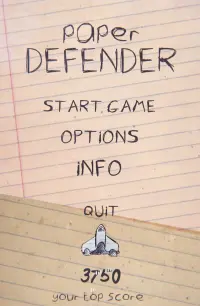
4. Call Tech Support
Sometimes you do everything right and it just doesn’t work. You go back to the start, try again, and it still doesn’t work. You go over and over and over and at that point, you might be inclined to throw in the towel, but hang on to that towel, my friend.
I tried to remake Tony Hawks Pro Skater (I know I know… point number 2, scopecreep). And… I tried to do it in a single day. Admittedly, it wasn’t a clever decision, but it seemed like fun.
Fun wasn’t the right word.
I started by making a skater. Then I made a skateboard. I made a ramp. All well and good but for some reason my skater kept floating into space. I mean, cool trick and all, but not exactly what I was aiming for. It was a frustrating few hours.
You ever see a bald man grow some hair just to rip it out?
It’s not a pretty sight. Before, during, or after.
But this floating-skater bug was maybe the most frustrating thing I’ve ever experienced in my life. It gave me the shakes. I’m not exaggerating. My fingers were shaking. I was about to yeet the laptop out the window, but instead, I decided to call tech support. And when I say tech support, I mean I asked for help in a Facebook group. Within minutes, somebody explained to me that I had this one little tick-box checked.
I unchecked it. No more floating into space. And I could breathe again.
In any solo-project, be it a book or a game, you don’t need to give yourself a mild case of stress-induced Parkinson’s when something isn’t working. You can always ask for help.
Maybe you can’t place a short story. Perhaps you’re wrestling with an author website or a mailing list signup form. Maybe you can’t get your head around multiple POVs. Perhaps your self-published novel isn’t selling. Whatever it is, don’t suffer in silence.
Call tech support. Ask a Facebook group. Post in a forum. Sign up for an online course (I believe LitReactor may have a few, wink wink). You don’t have to do this alone. If you had a problem with your phone or your laptop, you’d call a helpline. Why not do it for your creative pursuits, too?
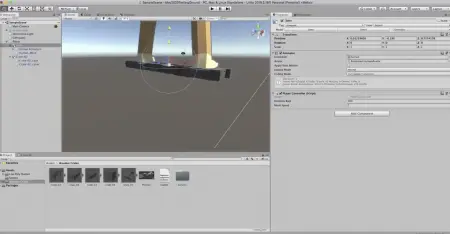
5. Join A Gang
It’s all well and good tapping into those support communities when you need them, but it’s just as important to give back. You need to ‘invest’ in your peer group.
I mean, Harry Potter didn’t find the philosopher's stone all on his own did he? Did he? I’m not actually sure I never read it, but I’m fairly certain he had a motorbiking uncle called Hagrid and a talking hat called Ronald, and I think there was an enchanted dressing gown called Hermione. I might have that bit wrong. Anyway, he had a whole gang of friends to talk shop with and that’s what you need!
You need to find a group of people who will play your game or read your work or watch your film, people who understand where you’re coming from and what your goals are.
In my GameDev journey, I often found myself looking through other students’ code and helping them with their issues, and in doing so, solidifying my own knowledge. I even made a couple of friends in those groups who then offered me valuable advice about my own projects in return.
In writing, too, make it a habit to proof your peers’ stories, help workshop an elevator pitch, or to just be their sounding board. They need you as much as you need them.
Don’t be a Grindelwald and hide yourself away in a sewer or whatever. I don’t know.
Honestly, I don’t know anything about the Potter books, but still… I’d like to end on that famous Harry Potter quote:
“Help people with their work, be it coding or writing or magic and stuff.”
That’s right, right?
HP said that?
Yeah.
So there we have it. It turned out that behind the curtain there wasn’t that much magic after all, just a sweaty balding Englishman in his pants, drunk on coffee and YouTube tutorials, crying his eyes out, screaming ‘WHY DON’T YOU WORK!?’ as he squints at a teeny-tiny laptop screen.
Amazing really.
I hope you learned something today that might help you in your creative pursuits. If not, then I’m sorry to have wasted your time.
P.S. If you wanted to take a walk on the wild side, and by wild side I mean games development, I would recommend the following resources:
The Engine
The Course
Some Online Tutorials
Humorous How-To’s
If you wanted to check out some of the games I made, you’ll find them here. And for the curious, I also put out a few development vlogs on YouTube.
And if you do decide to make something, send it along.
I’d love to play it!
Pew-pews or no pew-pews.
Cheers,
Luke
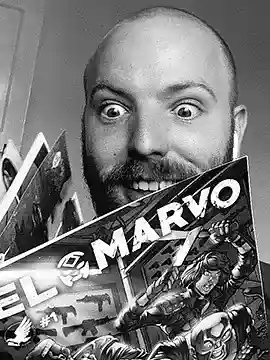
About the author
Luke Kondor is the writer and filmmaker behind several award-winning and viral thingamajigs, including THE OTHER STORIES — a weekly short story podcast with over 3-Million downloads and a Film/TV option, and EL MARVO — a crowdfunded comic book about a Luchador wrestler in a post-apocalyptic future.








